Iron daughter of India. Indira gandhi
and not from what he can borrow from others. "
Indira Gandhi
Indira Priyadarshini Gandhi was born in the ancient Indian city of Allahabad 19 on November 1917, in a family of Indian aristocrats. Her grandfather Motilal Nehru was an educated, energetic and extraordinary man, enjoyed a great reputation among his colleagues and took an active part in the political life of the country. The house he built in Allahabad, which was called the “Residences of Joy”, was a symbol of education and wealth for those around him. Under its roof, the best representatives of Indian society — lawyers, politicians, artists, poets, and teachers — gathered. The broad-minded owner did not distinguish between representatives of different nationalities and religions.
Motilal Nehru had three children: the daughters Krishna and Vijay and the son Jawaharlal (translated as “precious ruby”) were the father of Indira Gandhi. Using the privileges of belonging to the higher society of India, the younger Nehru graduated from a prestigious school in Harrow, and then a law faculty in Cambridge. In 1916, Jawaharlal married Kamal Kaul. The girl at the time was the sixteenth year, and she was ten years younger than her spouse.
Little Indira was born in the "Abode of Joy". Hindu gods were called to help Kamala (through the efforts of Jawaharlal's mother, who zealously observed all the rites) and the latest achievements of medicine in the person of the European doctor invited by Motilal Nehru. The disappointment, explained by the traditional expectation of the first male child, passed very soon - the baby earned all the affection and love of the household. Motilal often reiterated that the daughter of Jawaharlal Nehru would cost him thousands of sons. By the way, the young spouses no longer had children - Indira became the only heir of the father and the guardian of the family spirit. The name given to the girl was chosen by the grandfather. Indira was called by his mother, besides, the diminutive "Indu" was consonant with the name of the country, which in the family was considered a good sign. The second name of the girl - Priyadarshini - in translation means "Dear gaze."
The time of quiet childhood ended for Indira very quickly. After training in the English Bar Association, Jawaharlal worked with his father.
Younger Nehru was more and more captured by politics, especially the idea of India’s national independence. Britain, wanting to get the maximum benefit from their stay on this land, did everything possible to control the local population. Any means were used - privileges for the Indian nobility, power methods, manipulation of political events to increase the disunity of the people. It is logical that the movement for national liberation originated in India. It was headed by the Indian National Congress (or INC.) - a political party formed, ironically, with the blessing of the ruler of the colony Lord Ripon, who considered the creation of an opposition-controlled opposition a great attempt to mitigate the emerging contradictions. Held in Bombay in 1885, the founding congress proclaimed the main tasks of this association, which is to coordinate the actions of local patriots. Ways to achieve the goals put forward the most civilized, and the first period INC. Fully justified the plans of the creators - its members defended the interests of India and its representatives, adhering to completely loyal requirements. But over time, and especially after the First World War, such a liberal style of political relations between England and its colony began to seem ineffective to Indian patriots. A new generation has come to the party - energetic, young, demanding decisive changes.
Jawaharlal Nehru, having become a member of the INC on the recommendation of his father, did not hide his disappointment at the lack of unity within the organization and the indecisiveness of its members, allowing them to impose compromise solutions on the lucrative British administration. The political views of Jawaharlal Nehru himself were influenced by the European experience and theories developed by Mahatma Gandhi, one of the most ardent fighters for the rights of Indians. As a deeply religious man, Gandhi, who was revered in India as a saint, professed humanism and asceticism in the broadest sense and adhered to the principles of non-violence in politics. At his call, the inhabitants of the country refrained from purchasing goods from Europe, primarily luxury goods, salt and fabrics, and also refused to follow the laws adopted by the colonial authorities.
Civil disobedience, though peaceful, spread like an epidemic throughout India. The Motilal family Nehru maintained friendly relations with Mahatma Gandhi, the residents of the Resident Joy brought their usual comfort to national interests. Expensive dishes and furniture, along with other luxury items, went to the attic, women took off European dresses, jewelry and silks, dressed in simple saris. Indira, who was four years old, also contributed to this. Subjecting to the general impulse, she gave up her overseas outfits and burned her favorite toys at the stake.
Soon, Jawaharlal Nehru actually led the anti-colonial movement. He spoke a lot in public, participated in actions of disobedience and demonstrations, published the opposition newspaper Independent. His relatives were also in the thick of events: he supported his son Motilal, the sisters of Jawaharlal became members of the INC. And helped him by performing various assignments and speaking to the female population of the Indian provinces. Kamala shared the views of her husband. Mother remembered Indira as very beautiful, light-skinned and slender, she differed from the women of her circle with a sense of style and elusive grace. Love for her only daughter and spouse filled her whole life, giving her meaning and supporting in difficult moments.
Indira, devoid of communication with her sisters and brothers, was keenly interested in the problems of adults, absorbing their aspirations and hopes from an early age.
The school occupied Indu a little - the pro-British order ruling there seemed alien to her, far from those with which her relatives lived. She loved to read, giving preference, like many of her peers, romantic literature, telling of the exploits and battles for the happiness of mankind. For a long time, the beloved heroine of a young Indian woman was Jeanne d'Arc. Thanks to her excellent knowledge of the English language, Mark Twain, Charles Dickens, HG Wells and Rudyard Kipling were on her list of favorite authors. On the advice of the wise Mahatma Gandhi, the eight-year-old Indira created a children's crafts section, which became a symbol of the national movement (the Indian spinning wheel is not depicted on the INC’s flag). Children who wanted to be involved in the common cause, came to the "Resident of Joy" and weaved scarves or made swamps (caps), which became the insignia of the opposition.
In 1926, Kamala’s painful condition caused by preterm birth (the baby was born only two days) caused Jawaharlal Nehru's family to travel to distant Switzerland. There, at the mother of Indira, the doctors discovered tuberculosis and recommended her to live in European resorts. Seeing in the healing climate the only way to save Kamala’s life, Indira’s family settled in Geneva, where a nine-year-old girl had to take on most of the household duties due to the difficult condition of her mother. A year spent far from home, left in the memory of Indu many colorful memories - about new countries, about an amazing journey across the ocean, about new people, about the winter entertainment of local kids: skis, skates and romp in the snowdrifts were unknown to her until that time.
In Switzerland, Indira studied at a local school. The main difficulty was that the training was carried out in French, which was completely unfamiliar to the girl, and which had to be studied practically from the alphabet. Despite living far from India, Nehru’s small family was happy at the time — Kamala was slowly but surely recovering, Indira was successfully engaged in school, and Jawaharlal Nehru visited European capitals and made contacts with public organizations, the press and various political forces.
After returning from Europe, the Nehru family with new energy joined the struggle. In 1927, Jawaharlal, on the recommendation of Gandhi, who noted his “crystal honesty”, was elected chairman of the INC. No repression, no punitive sanctions, no fines could no longer keep the situation - Indian society was getting out of control of the British. Jawaharlal Nehru, Gandhi, Motilal Nehru and other leaders of the National Congress were constantly arrested, but the liberation movement attracted more and more followers.
Despite her age, Indira was at the center of political opposition. She was one of the few who enjoyed the absolute trust of Jawaharlal Nehru, and in political affairs he relied on her in no way less than at home. Together with her peers, the girl took part in the activities of the so-called "monkey squads". Members of the youth movement engaged in hanging opposition flags, cooked food for the demonstrators, and provided first aid to police casualties (for these purposes, an infirmary was organized in Nehru's house).
In 1930, Indira’s father and grandfather were arrested (Kamala went to prison in 1931). However, neither these arrests nor the subsequent ones had any influence on the girl’s determination to continue the work begun. "History reading is good, but it is even more fun to help her do it, ”said father to Indira. In the 1931 year, Motilal Nehru died, asthma attacks and high blood pressure crippled this tireless person. At the same time, realizing that the family’s lifestyle does not allow her daughter to receive a full-fledged education, Jawaharlal Nehru arranged for her boarding school of her acquaintances, the Vakil spouses. The system of training there is strikingly different from the English, adopted in the colonial schools. Class subjects combined with the study of arts and folk crafts, among students cultivated independence, mutual aid and creative initiative. During her studies, Indira was the secretary of the literary circle, and she also took a great interest in folk dances.
In the spring of 1934, Nehru's daughter passed the exams at Santiniketan, India’s first national university, organized by Rabindranath Tagore. In the year of Indira’s admission to the university, her father was taken into custody again, and her mother struggled with her illness and almost never left the hospitals. The famous Shantiniketan was located in the vicinity of Calcutta and was organized in accordance with Tagore's ideas about the balance of spiritual and natural principles. Classes, libraries and workshops looked like cozy huts and were located in green parks and groves. The working day began with the sunrise - household worries flowed into classes, and then into creative exercises. The basis of the philosophy of the national university was freedom of choice and initiative. Indira gave particular preference to the study of foreign languages and the arts, especially painting and choreography. But she did not succeed in completing Santiniketan. In 1935, Kamala’s condition worsened dramatically, and the Nehru family, taking advantage of Jawaharlal’s release, again moved to Europe. The last hope of the doctors pinned on the famous resorts of the Black Forest.
Treating the best doctors and the mountain air did not help - Kamala passed away in Europe at the beginning of 1936. And soon followed by Indira’s grandmother, Motilal’s wife. The head of the family returned to his homeland, and Indus, by decision of his father, went to England to enter Oxford. She spent the next five years away from home, studying politics and history. Her education was not limited to the walls of the university premises. During these years, Indira, along with Jawaharlal Nehru, traveled extensively to a wide range of countries in Asia and Europe, took part in father meetings with public and government leaders, in debates and rallies. A rich life affected her academic performance, but allowed the girl to gain invaluable experience that could not replace any academic diploma. The completion of studies at Oxford coincided with the start of World War II in Indira’s life. In 1941, distressed by the situation in Europe, as well as by the policies of the colonial authorities, who had drawn her country into military action, she left for India.
In 1942, Indira got married. She met her spouse Feroz Gandhi (not a relative, but only a namesake of Mahatma Gandhi) in her youth. In addition to mutual sympathy of young people united common views. Indira's relatives treated the boy favorably - once he helped Indira’s grandmother, who was injured at the rally by the hands of the police, safely reach the house. However, the candidacy of Feroz Gandhi was never considered to be Indu's fiancé The thing was that the young man came from the Parsis, the descendants of Persians who were professing Zoroastrianism from Persia. In addition, the Feroz family belonged to a lower caste. A similar union in Indian society was regarded as a blatant violation of centuries-old foundations.
The friendly relations between Feroz and Indira strengthened during the years of study abroad (Gandhi graduated from the London School of Economics). Feroz repeatedly made Indira a marriage proposal. However, the girl always put off the decision, and only in the summer of 1937, after a memorable explanation in Montmartre, did she promise Gandhi to marry him after graduation. Returning to India, the young began preparing for the wedding, but, as expected, public opinion reacted strongly against the marriage of the daughter of a famous politician. Even the authority of Jawaharlal could not smooth out the scandal that broke out. He himself, by the way, was related to the marriage of his daughter without enthusiasm, but resigned himself to what was happening, perfectly knowing her character. The only one who could influence public sentiment was the righteous Mahatma Gandhi. And, despite the zealous observance of Hindu traditions, he blessed the bride and groom. The wedding ceremony took place on March 26 1942 in a park near the "Abode of Joy" - it was specially used the ancient rite, which appeared before the rise of Hinduism.
After the honeymoon spent in Kashmir, the newlyweds settled in their own apartment in Allahabad. As before, their whole life remained connected with the struggle for the independence of the country - the spouses Gandhi organized protest rallies, for which each of them was imprisoned at various times. In addition, Feroz was fond of journalism and worked with the opposition press. In 1944, the first child was born in their family, named Rajiv Ratna. Despite the doctors' fears for the life of Indira, the delivery was successful, and she sincerely rejoiced at motherhood. And in December, 1946 was born the second son - Sanjay.
Meanwhile, the battle for the independence of India entered a crucial phase. Through the efforts of Nehru and his associates, the plans of the British government regarding dividing the country into hundreds of individual territories were never implemented. In the summer of 1947, India gained the desired freedom, and Indira's father was elected first prime minister.
The main problem after independence was interfaith and ethnic conflicts that broke out in the country. In addition, there were other problems in India - lack of qualified personnel, poverty, lack of ties with other countries. Indira did not participate in these events - she only learned politics, and besides, children took away a lot of her time and energy. She recalled this period: "... My main problem was the reconciliation of public duty with the responsibility to the children and home." However, after a few years, she became the closest ally of Jawaharlal Nehru, accompanying him on all foreign trips and worrying about all the little things and nuances of diplomatic work. It is known that it was she who advised her father to pin a red rose, the symbol of liberated India, to her clothes, which later became the emblem of the Nehru dynasty.
On the road to a career as a politician, Indira Gandhi had to overcome many obstacles, the first of which was her own shyness and uncertainty. These qualities, multiplied by the restraint inherent in women of the East, at first strongly interfered with her public speaking. In the fifties, through the efforts of Indira, the women's department and the youth organization of the INC were organized. In February, 1959 was elected chairman of the Congress, India’s largest party. Despite the difficulties in this post, Indira confirmed the reputation of a competent specialist who possesses, in addition to her knowledge and experience, a purely female diplomatic gift, ability to listen and hear the interlocutor.
It was becoming more and more difficult to do every year at the same time with her own family life and the government residence where her father worked. With age, Nehru needed more and more help, while Feroz was dissatisfied with Indira's constant absence - his wife’s social activities were contrary to his ideas about the family structure. Relations between them deteriorated, Indira, distressed by the situation, wrote to a friend: "... I missed the most remarkable thing in life - a perfect and complete merger with another person." In September, 1960, after a heart attack, 48-year-old Feroz Gandhi died in Delhi Hospital. His wife, hastily returned from another trip, found only the last moments of his life. After losing her husband, Indira said: "I feel devastated, lost and dead, but I must live on." But in May, 1964 was to endure a new blow to it - Jawaharlal Nehru died. Many expected that his daughter would immediately lay claim to the post of prime minister, but Indira was smarter. Not wanting to provoke a power struggle, she supported the weakest of the contenders, 60-year-old Lal Bahadur Shastri, while she herself was appointed Minister of Broadcasting and Information.
In January, 1966, Shastri died suddenly, and the country began to struggle for his place. For the numerous participants in the political confrontation, the appointment of Nehru’s daughter as prime minister meant a compromise solution. In varying degrees, they all had respect for the family of the national hero and believed that Ms. Gandhi’s lack of experience would allow her to influence her decisions. On the day of the parliamentary vote, one of the deputies was no longer able to hold back, asked his colleague, who was involved in the counting of votes, the historical question: “Boy or girl?”. Ignoring the disclosure of the protocol, he replied with a smile: "Girl." So for the first time patriarchal India was headed by a female politician.
The hopes of those who hoped to manipulate Mrs. Gandhi did not come true. She said: "My advantage was the education given to me by my father ... I had to make twice as much effort to prove that I was not only his daughter, but also a person in and of itself." Just like Jawaharlal Nehru, Indira Gandhi quickly learned, and was much more rational and pragmatic in decision-making. The press openly admired the Prime Minister’s determination, during the Indo-Pakistani conflict, she was openly called “the only man in the office of old women”.
As for the most important ability for a high-ranking diplomat to speak, there was no equal in this area to Ms. Gandhi. Having devoted all her life to politics, she subtly felt the aspirations and mood of the audience, unmistakably chose intonation and the right words, giving the phrases the necessary emotionality and weight. Thanks to her fearlessness and the gift of persuasion, Indira Gandhi successfully performed in front of the most difficult audience. There are cases when she alone managed to calm the angry crowd, saving another victim of inter-religious conflicts from the massacre of fanatics. Many statements of Gandhi regarding the situation in India have become aphorisms that have a universal meaning:
“History is the best teacher with the worst students.”
"There is no path to freedom, for freedom is the path."
"You can not shake the outstretched hand, if your hand is clenched into a fist."
“Martyr’s death is not the end, it’s just the beginning.”
“There are two types of people - some live in debt, others work. It is necessary to try to be in the second group, there is much less competition there. ”
"People love to forget their responsibilities, but always remember their rights."
“You must be able to stay calm in the thick of events and be active during a lull.”
The peculiarity of the direct and active nature of Indira Gandhi was the attention to people, which she displayed both in her political career and in private life. Indira herself said this: “I love being among people. I do not perceive them as some kind of gray mass, I see everyone individually, I peer at people's faces so closely that I recognize a person if I have ever seen him in a crowd before. ”
Indira Gandhi’s public activities made her popular around the world. During her lifetime, she was awarded dozens of state and academic awards in India, the USSR, Great Britain, Japan and other countries. Not much was known about Ms. Gandhi’s personal space — her favorite place in the house was the library. In the morning and in the evening she practiced yoga, watched her appearance, although, like her mother, she practically did not use cosmetics and did not wear any jewelry. Indira Gandhi chose toilets meticulously, rarely changing national clothes and carefully matching colors of fabrics with details of decoration. To the questions of reporters, the prime minister has always been indulgent, at the same time not allowing the slightest familiarity. No one, even the most experienced sensational masters, have ever managed to provoke it or extract information about private life. To the naive question: "Who would you like to be?", She always answered with a smile: "By himself."
In the development strategy of India, Gandhi tried to keep to the course laid down by her father and focused primarily on preserving the integrity of the country and carrying out large-scale social transformations. It achieved significant results in the field of health and education, and government regulation had a positive impact on the development of industry. The policy of rapprochement with the USSR and unpopular reforms such as the nationalization of banks caused a split in the INC in 1969, after which Indira Gandhi became the head of the independent Congress party. She continued to follow the principles of non-alignment and peaceful coexistence declared by Mahatma Gandhi and Jawaharlal Nehru, but the Third Indo-Pakistani war of 1971 of the year clearly showed that India could defend its interests weapons.
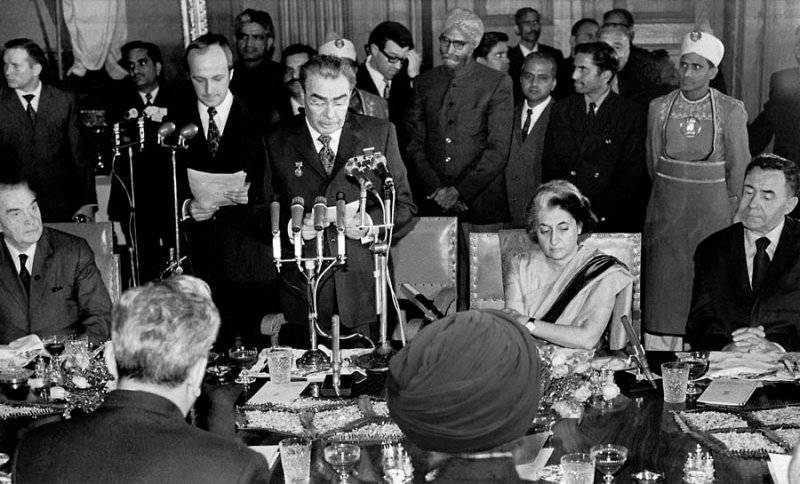
Speech L.I. Brezhnev at a reception in the presidential palace Rashtrapati Bhavan. New Delhi, November, 1973
In the years of Indira Gandhi’s work, the departments of space, electronics, ocean exploration, environmental protection were organized as the Prime Minister in India, and the first nuclear power plant was built. Activities in agriculture, called the "green revolution", have reduced the country's dependence on food imports. One of the most important achievements of Mrs. Gandhi was the strengthening of the international authority of India - thanks to diplomatic successes, the country occupied a dominant position in the South Asian region. It is worth noting that in search of a better solution to social problems, the Prime Minister has relied on mutually beneficial cooperation with the Soviet Union. Indira Gandhi has visited the USSR more than once and always spoke warmly about the citizens of our country, who amazed her with hospitality and cordiality.
It should be noted that despite her successes, Gandhi never harbored illusions about the full support of her reforms, knowing full well that it was impossible to please everyone. Charges, criticism and threats to it were a familiar component of political everyday life. The Prime Minister tried to soberly assess the danger from opponents and tried to predict their future actions. In the 1975 year, after the opposition charged her with violating election laws, Indira Gandhi, taking advantage of the constitutional provision, imposed a state of emergency in India. This period, despite the solution of several problems of a political and economic nature, undermined the authority of the ruling party.
The most unpopular initiative was the Family Planning project. His goal was to demographic regulation of the standard of living of the poorest segments of the population (in the West they even wrote about forced sterilization). Such interference in the traditional way of life of Indian society resulted in a mass protest that cost Gandhi the premiership - she lost the 1977 elections of the year, and her own party excluded her from their ranks. On fabricated charges, she was even imprisoned for two weeks. It is curious that one of the charges accused her of stealing chickens during trips around the country.
However, Indira Gandhi was stoically inflexible and returned to power, creating a new party of the INC (I) (“I” meant “Indira” and with it “India”). The political and economic crisis of 1980 of the year forced residents to recall the stable times of its reign. Early elections were held, and the Indira party became at the helm of power. Mrs. Gandhi was already not young, however, having headed the government, she actively joined in the work. Among its main successes of that time, it is worth noting participation in the international Non-Aligned Movement to military blocs. Her struggle with the backwardness of the economy and poverty was also bearing fruit, but the results were more modest than those that the Prime Minister wanted to see. In general, over the years Indira was in power, the proportion of Indians who fall below the poverty line decreased from 60 percent to 40, and the average life expectancy rose from 32 years to 55.
Meanwhile, one of the pressing problems remained separatism, threatening the unity of the entire state. During the second period of Gandhi, the situation in the state of Punjab, initiated by the Sikhs living there, worsened. This religious community, which in those years numbered about 10 millions of people, was associated with the lands of India from the sixteenth century. In the seventeenth century, the Sikhs even founded their own state, but with the beginning of British rule, it ceased to exist. At the end of the twentieth century, extremist Sikh organizations demanded the creation of an independent state of Halistan on the site of the state of Punjab. The center of confrontation between government forces and Sikh rebels in 1982 was the Golden Temple in Amritsar. According to the government, the main Sikh shrine was a center for the production and storage of weapons. This, in turn, was the reason for conducting a military operation. The decision to use force was given to Indira Gandhi extremely difficult, but, according to her, such a clear threat to the unity of the country demanded emergency measures from her.
In 1984, during the operation called "Blue Star" with the participation of military equipment and regular units of the Indian army, the Golden Temple was taken by storm. The insurgency was suppressed, but more than five hundred defenders, including peaceful pilgrims, fell during the shelling. The event was widely publicized both in India and abroad. The Prime Minister was bombarded with threats, but despite this, Indira Gandhi flatly refused to remove from her bodyguards representatives of the Sikh community, who traditionally considered military service to be their preferred activity. With such an act, the Prime Minister emphasized that she did not show any distrust regarding all adherents of this religion and did not suspect them of extremist sentiment.
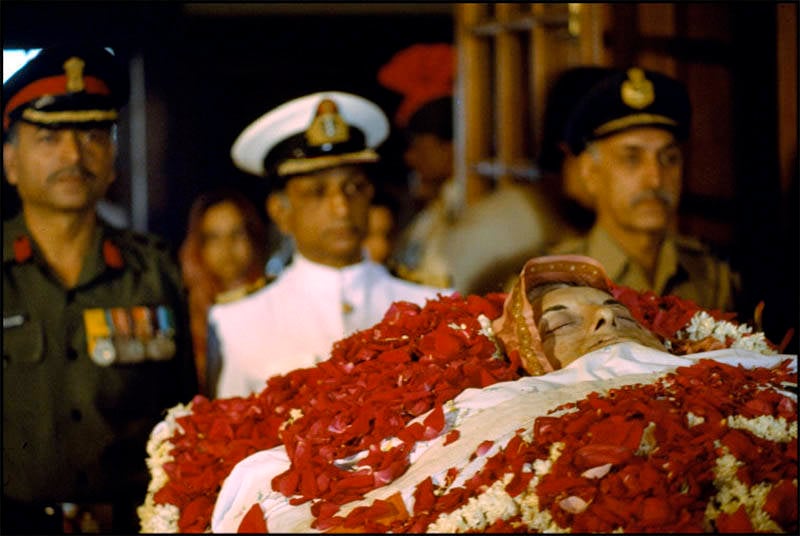
October 31 Indira Gandhi's 1984 had an appointment with Peter Ustinov, an English actor, writer and publicist. The path of the Prime Minister to the reception room, where guests were waiting for her, passed through an open courtyard. Two Sikh bodyguards were on duty there. Upon reaching them, Ms. Gandhi said hello. In response, the left guard took out a revolver and shot at it, and his partner slashed at close range with an automatic burst. The remaining guards rushed to the shots, the Sikhs were killed, and the wounded Indira was sent to the Indian Institute of Medicine, where the best doctors were waiting for her. Twenty bullets, received by a fearless woman from her own bodyguards, were the last test of her life. Four hours later, she died, never regaining consciousness.
Two days later, Indira Gandhi’s body was, according to Hindu custom, burned on the bank of the Jamna River. The funeral pyre was lit by her son Rajiv Gandhi, a pilot by profession, practically forced to take the place of the prime minister. Ash was scattered over the chain of the Himalayan mountains. At this time, mass antisikh speeches and pogroms were taking place in the country. In one of his first speeches, the new prime minister said: “My mother gave her life for the Indians to live as a family. Do not disgrace her memory! "
There is a suggestion that Indira Gandhi knew about the assassination attempt being prepared for her. On the eve of her death, she made a will and ordered in detail the ceremony of her funeral. And in the morning of October 31, she refused a body armor, which, at the insistence of the head of security, wore all the past months. Rajiv Gandhi wrote to his son: “I am sure grandmother knew that he would die that day. Many actions indicate that she was preparing to part with us, and not because she wanted to, but because life forced her to make harsh decisions, and she made the decision that she had to make as the leader of her people. ”
Seven years later, in the course of the next election campaign, Rajiv was killed by an explosion set up by Tamil terrorists. After that, the INC was headed by his wife, Sonya Gandhi. Currently, the post of vice-president of the party is occupied by their son Rahul Gandhi, representing the fifth generation of the eminent dynasty.
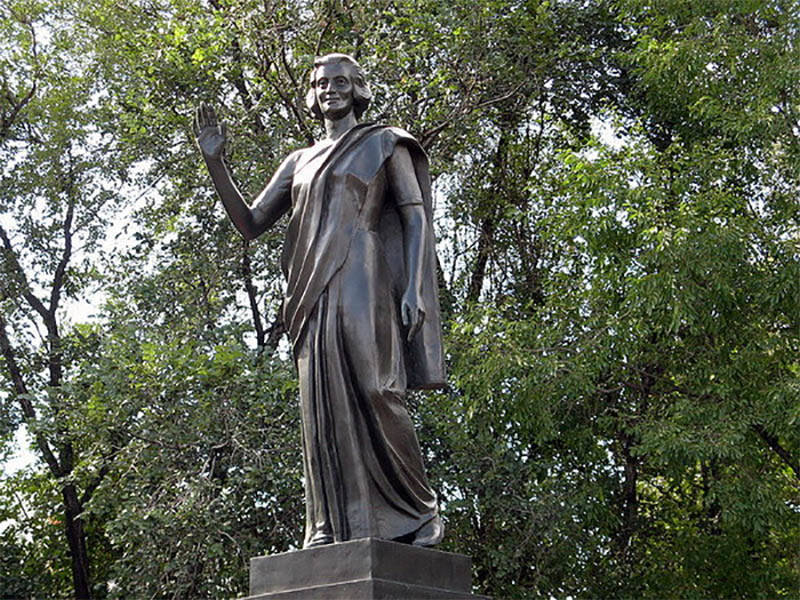
Based on materials from the site http://www.vokrugsveta.ru/ and the weekly publication History in Female Portraits
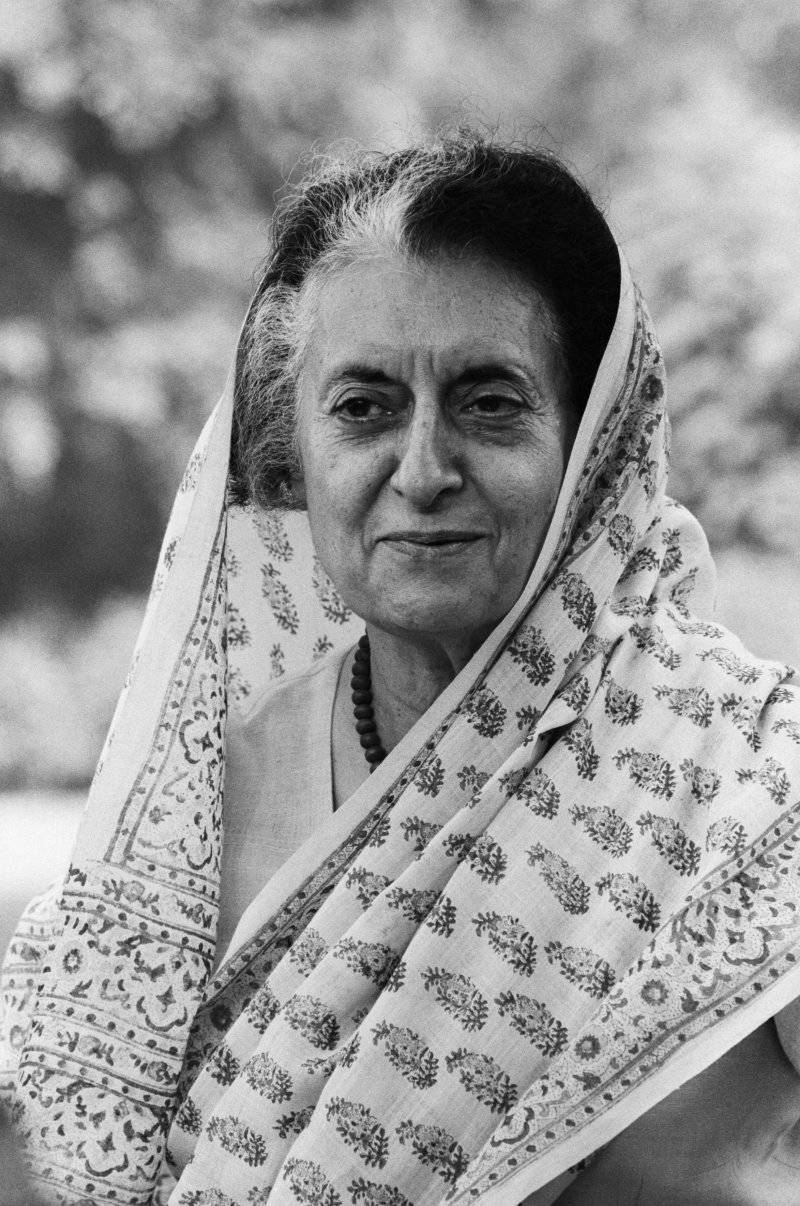
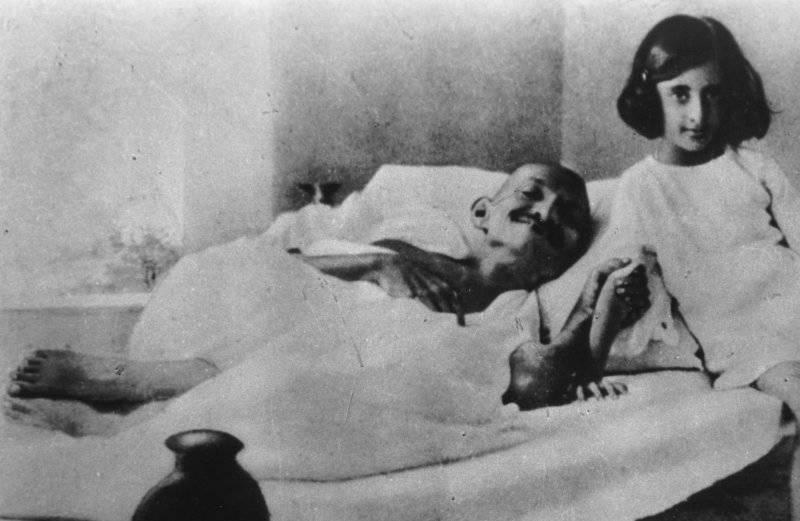
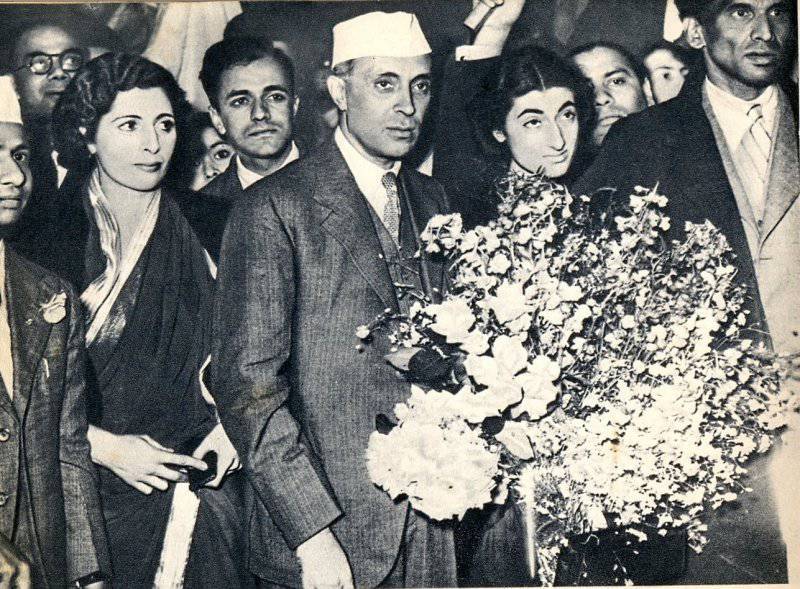
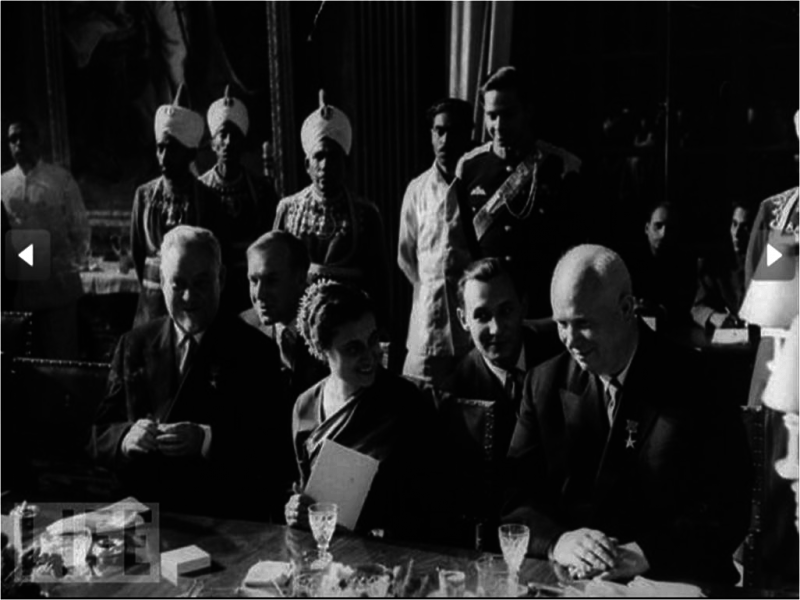
Information